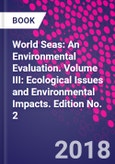World Seas: An Environmental Evaluation, Second Edition, Volume Three: Ecological Issues and Environmental Impacts covers global issues relating to our seas, including a biological description of the coast and continental shelf waters, the development and use of the coast, landfills and their effects, pollutant discharges over time, the effects of over-fishing, and the management methods and techniques used to ensure continued ecosystem functioning. The relative importance of water-borne and airborne routes differ in different parts of the world is explored, along with extensive coverage of major habitats and species groups, governmental, education and legal issues, fisheries effects, remote sensing, climate change and management.
This book is an invaluable, worldwide reference source for students and researchers concerned with marine environmental science, fisheries, oceanography and engineering and coastal zone development.
Please Note: This is an On Demand product, delivery may take up to 11 working days after payment has been received.
Table of Contents
1. The Mangrove Ecosystem 2. Global Status of Coral Reefs: In Combination, Disturbances and Stressors Become Ratchets 3. Status and Trends for the World's Kelp Forests 4. Salt Marshes: Their Role in Our Society and Threats Posed to Their Existence 5. Remote Sensing for Marine Management 6. New Advances in Benthic Monitoring Technology and Methodology 7. Seabirds 8. Blooms of the Moon Jellyfish Aurelia: Causes, Consequences and Controls 9. European Protection of Fisheries in the North East Atlantic 10. Ghost Fishing 11. Far-Field and Near-Field Effects of Marine Aquaculture 12. The Making of a Global Marine Fisheries Catch Database for Policy Development 13. Ballast Water: Problems and Management 14. Debris in Deep Water 15. Polychlorinated Biphenyls in the Global Ocean 16. Microbial Remediation of Organic Pollutants 17. The Threats from Macroplastic Pollution on Marine Environment: An Analytical Overview 18. Marine Pollution by Microplastics: Environmental Contamination, Biological Effects, and Research Challenges 19. International Instruments for the Prevention of Marine Alien Invasive Species 20. Underwater Noise: Sources and Effects on Marine Life 21. Marine Oil Spills Oil Pollution, Sources and Effects 22. Marine Oil Spills Preparedness and Countermeasures 23. Threats to Seamount Ecosystems and Their Management 24. Dead Zones: Oxygen Depletion in Coastal Ecosystems 25. Marine Protected Areas: Attempting the Sustainability of the Seas 26. Shoreline Defenses 27. Environmental Effects of Marine Transportation 28. Collisions of Vessels with Cetaceans The Underestimated Threat 29. Marine Protected Areas 30. Marine Spatial Planning 31. The Role of Ports in a Global Economy, Issues of Relevance and Environmental Initiatives 32. Molecular Approaches for an Operational Marine Biodiversity Observation Network








